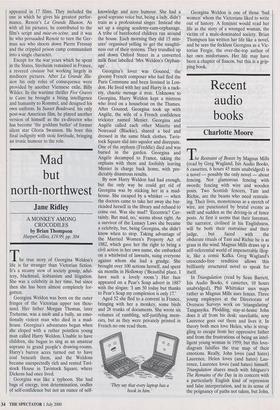Mad but north-northwest
Jane Ridley
A MONKEY AMONG CROCODILES by Brian Thompson HarperCollins, £19.99, pp. 304 The true story of Georgina Weldon's life is far stranger than Victorian fiction. It's a steamy stew of society gossip, adul- tery, blackmail, lesbianism and litigation. She was a celebrity in her time, but since then she has been almost completely for- gotten.
Georgina Weldon was born on the outer fringes of the Victorian upper ten thou- sand. Her father Morgan Thomas, later Treheme, was a snob and a bully, an emo- tionally violent man who died in a mad- house. Georgina's adventures began when she eloped with a rather pointless young man called Harry Weldon. Unable to have children, she began to sing as an amateur soprano in grand people's drawing-rooms. Harry's barren acres turned out to have coal beneath them, and the Weldons became unexpectedly rich and rented Tavi- stock House in Tavistock Square, where Dickens had once lived.
Georgina was like a typhoon. She had bags of energy, iron determination, oodles of self-confidence but not an ounce of self- knowledge and zero humour. She had a good soprano voice but, being a lady, didn't train as a professional singer. Instead she set up a singing academy-cum-orphanage. A tribe of barefooted children ran around the house. Each morning they did 15 min- utes' organised yelling to get the naughti- ness out of their systems. They trundled up and down Oxford Street in a converted milk float labelled 'Mrs Weldon's Orphan- age'.
Georgina's lover was Gounod, the gloomy French composer who had fled the Paris Commune and been lionised in Lon- don. He lived with her and Harry in a rack- ety, chaotic menage a trois. Unknown to Georgina, Harry Weldon kept a mistress who lived on a houseboat on the Thames. After Gounod, Georgina took up with Angele, the wife of a French confidence trickster named Menier. Georgina and Angele called each other Minette and Noireaud (Blackie), shared a bed and dressed in the same black clothes. Tavis- tock Square slid into squalor and disrepute. One of the orphans (Freddie) died and was buried in the garden. Georgina and Angele decamped to France, taking the orphans with them and foolishly leaving Menier in charge back home, with pre- dictably disastrous results.
By now Harry Weldon had had enough, but the only way he could get rid of Georgina was by sticking her in a mad- house. She escaped by a whisker — when the doctors came to take her away she bar- ricaded herself in the library and refused to come out. Was she mad? 'Eccentric? Cer- tainly. But mad, no,' seems about right. As a survivor of the Lunacy Laws she became a celebrity, but, being Georgina, she didn't know when to stop. Taking advantage of the Married Women's Property Act of 1882, which gave her the right to bring a civil action in her own name, she embarked on a whirlwind of lawsuits, suing everyone against whom she had a grudge. She brought over 100 actions herself, and spent six months in Holloway (`Beautiful place. I have such a lovely room.') Her face appeared on a Pear's Soap advert in 1887 with the slogan: 'I am 50 today but thanks to Pear's Soap my complexion is only 17.'
Aged 52 she fled to a convent in France, bringing with her a monkey, some birds and 28 trunks of documents. She wrote six volumes of rambling, self-justifying mem- oirs, but as they were privately printed in French no one read them.
`They say that every laptop has a book in him.' Georgina Weldon is one of those 'bad women' whom the Victorians liked to write out of history. A feminist would read her life as the story of a wronged woman, the victim of a male-dominated society. Brian Thompson has written her life like a novel, and he sees the feckless Georgina as a Vic- torian Fergie, the over-the-top author of her own misfortunes. Her life may have been a chapter of fiascos, but this is a grip- ping book.


























































 Previous page
Previous page